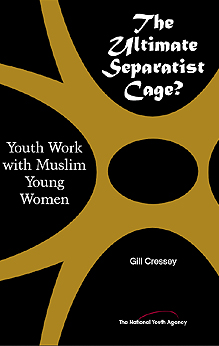
Author: Gill Cressey
Genre: Muslim girls
Publisher: The National Youth Agency
Release Date: March 2007
Pages: 60
Source: http://www.mywf.org.uk/uploads/mywf_timeline_files/USC.pdf
In her introduction, Dr Gill Cressey – a lecturer at the School of Education, University of Birmingham – explains that the phrase ‘The Ultimate Separatist Cage’ reflects the title of a workshop at the December 2005 Conference on Muslim Youth Work – and “remarks being made at the time by senior politicians about Muslims in Britain and about the position of Muslim women in families and communities”. The report challenges this stereotype of Muslim women entering into the purdah of isolation. It presents numerous project reports and case studies where Muslim women have shown leadership and initiative where their preference for a single sex working environment has been respected.
Dr Cressey observes that “the orientalist construction of Muslim women as passive victims, particularly those who wear the veil is still a powerful discourse impacting on the politics of work with young Muslim women and their families.” Too right. As recently as March 2009 the Economist reported of “Labour women, intolerant of Islamist views on gender, [that] make up a disproportionate chunk of those demanding change [in Government policy dealing with Muslims]. Ms Smith and Ms Blears have backbench allies such as Kate Hoey, Ann Cryer and Ruth Kelly [26th March 2009]. The stereotypical view that by and large Muslim women are compelled into isolation because of an inherent misogyny in the religion thus has wider ramifications.
The aim of the report “is to introduce a range of reasons why youth work organisations engage in women-only work, particularly with young Muslim women…my aim is to provide examples of good practice and to draw lessons from the accounts of youth workers and young women about what works and what can make youth work accessible and effective in the lives of a variety of Muslim young women. I examine how some very different projects involve Muslim young women and how they deal with some of the issues face, and discuss the mix of gender specific and gender sensitive work that I believe is needed so that Muslim young women have choices of engagement with youth work and safe spaces for personal development and participation without being unhealthily ‘separtist’.”
Projects outlined include Ulfah Arts (Naz Koser), Birmingham Univeristy Islamic Society (Farida Chand), Saheli Women’s Group (Rakhyia Begum), Bolton lads and Girls club (Nafisa Mallu and Alanna Rice), the SAFE project in Sparkhill, Birmingham (Manaf Alderwish) and other experiences in Birmingham, Leeds and London.
Dr Cressey has little time for the patronising attitude towards women she feels exists in many mosques. She also asks difficult questions, “Is the only acceptable environment for young Muslim women Women-only, Muslim-only and and educational programme designed to prepare them to be good wives and mothers and to know enough about Islam to be the first religious teachers of their children? Taqlid or emulation is a widely used idea in the Muslim world when it comes to children and young people …and many Muslim parents have an expectation that youth workers and teachers must set a good example in their behaviour and conduct…[but] are we trying to socialise young women into existing roles perpetuating control over them by men and by elders or supporting their development by offering a space to be themselves and to make life choices of their own?”
She also asks, “the language of liberation from oppression, exploitation and poverty is out of fashion but is it not relevant to describe the needs of young Muslim women in Britain at the present time? Inferiorisation and exploitation of women are challenged in the Qur’an. The ‘cultural need’ that is thought to produce a particular need for women-only provision for young Muslim women is about not mingling with young men because of strict expectations not to be attracted to the opposite sex outside marriage. Separation should not be confused with control and subordination. It is the nature of the space allocated to young Muslim women that is important regarding whether the space is controlling or liberating, a place to feel safe, at home, valued an accepted or a place to feel restricted an contained…intentions matter and rather than creating a cage to trap ourselves we need to be really clear about when an why we need deliberately gendered spaces in youth work”.
The report ought to be sent to all our dar ul-ulooms so that the next generation of imams are able to absorb these nuanced messages.
